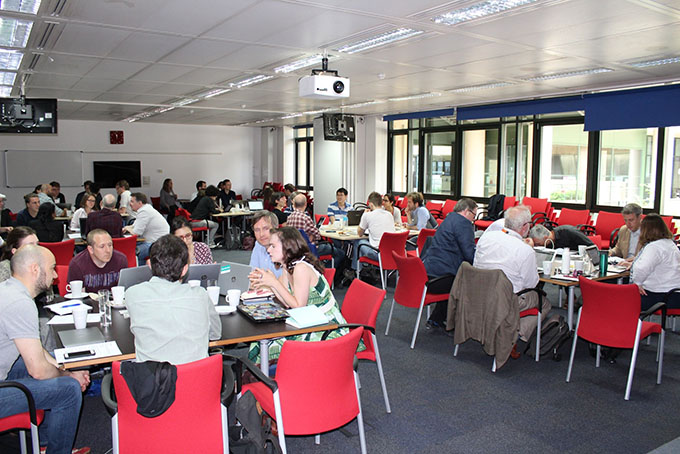In February 2019, King’s College London’s Department of Digital Humanities, together with The National Archives, the Digital Curation Innovation Center at the University of Maryland iSchool, and the Maryland State Archives in the US, were awarded an Arts and Humanities Research Council (AHRC) one-year International Research Networking grant for UK-US Collaborations in Digital Scholarship in Cultural Institutions.
This AHRC-funded network addresses the field of Computational Archival Science (CAS), specifically the application of computational methods to the contextualisation of records within archival collections, at a time when the archive is becoming an increasingly digital space.

Workshop participants working in groups
As part of this AHRC-funded research network, on Thursday 20 and Friday 21 June 2019 The National Archives organised the workshop CAS: Exploring Data, Investigating Methodologies.
The workshop welcomed 45 participants from the institutions mentioned above, but also from The Alan Turing Institute, King’s Digital Lab, City University, University of Edinburgh and University of Brussels, to name just a few. The participants formed six small interdisciplinary groups and explored selected datasets from our collections here at Kew. Each group was led by two leaders (pairing expertise from within The National Archives and from external collaborators) and studied the data by experimenting with exciting tools and methods.
The participants were divided into six groups and explored particular collections and research areas:
Group 1: Archivists, computer science researchers, and scientists from our Collection Care department and data science researchers explored videos and images from the London Olympics 2012 and the UK Supreme Court sessions, using visual search techniques.
Group 2: A mix of data analysts, software engineers and data managers worked with The National Archives’ legislation data and experimented with visualisation techniques.
Group 3: A group consisting of historians, military experts, visualisation experts, data analysts and digital curators explored The National Archives’ War Diaries data, and experimented with visualisation techniques.
Group 4: A multidisciplinary group experimented with topic modelling using The National Archives’ Cabinet Papers.
Group 5: Seven experts bringing various specialisms to their group explored data from The National Archives’ Web Archive, experimenting with network analysis.
Group 6: A group of experts, led by colleagues from the Alan Turing Institute’s Data Science and Digital Humanities Working Group and coordinated by the CAS network’s leadership team, had an overarching view of all the working groups. They provided guidance, found synergies, made constructive interventions, and ensured ideas and methods were cross-fertilised.

Giovanni Colavizza, Senior Researcher at The Alan Turing Institute, presents his group’s work on visualising data from The National Archives’ Web Archive
The main objectives of the groups were:
- Data exploration: To understand and experiment with The National Archives’ collections.
- To open the ‘black box’ of research: Instead of focusing on progress, the groups were asked to emphasise process, by understanding the methodological and theoretical challenges their group encountered and the decisions they made (what worked/what did not work and why).
- To focus on interdisciplinarity: The groups were asked to consider all the tasks and steps that they undertook, and to allow room for discussion and decision. They were able to explore new questions and find new answers, seek out commonalities and common challenges, and develop a common language and thought process.
I would like to thank all the participants for their contributions, enthusiasm and participation. Special mention should be made of the leaders of the six groups, who brought their expertise to bear with passion during the weeks leading up to the workshop, as well as over its two days. By sharing their experience so generously, they have shown us how knowledge exchange, teamwork, and interdisciplinary collaborations can be done.

The core partners of the AHRC-funded CAS network photographed with Prof David De Roure and David Beavan, from the Alan Turing Institute’s Data Science and Digital Humanities Working Group
The Exploring Data, Investigating Methodologies workshop is part of a series of network events held in both the US and the UK, which explore how collections can be made available, digitally, for large-scale computational research. For more information about the network and its activities, you can visit the network’s page.